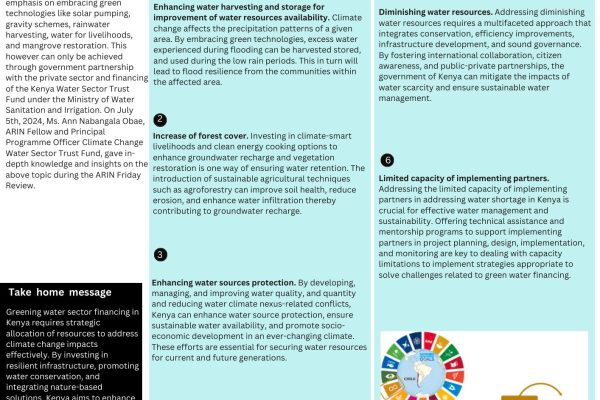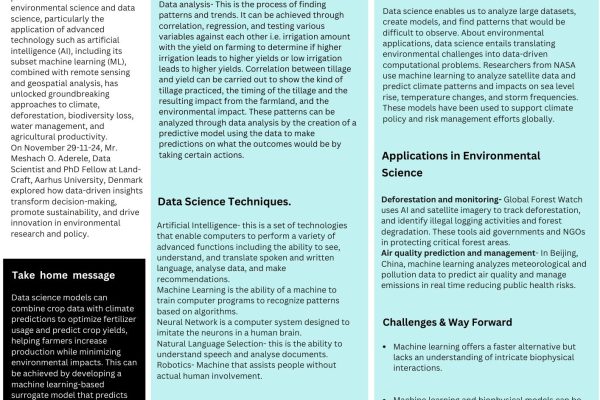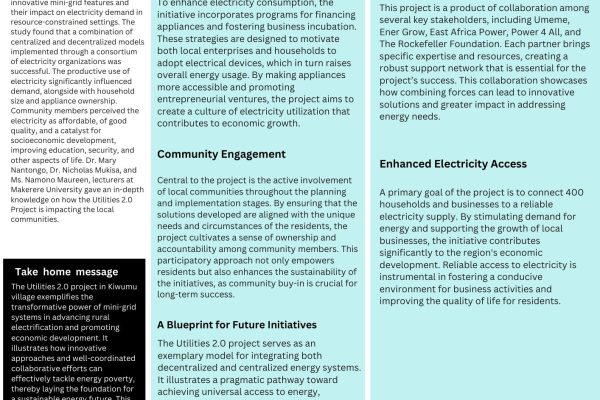Introduction
In this modern world, data analytics influences the creation and execution of evidence-based policies. Evidence-based policies, which are supported by data and actual evidence, are crucial for tackling complicated societal problems. Data analytics allows policymakers to examine extensive amounts of data, recognize trends, and make well-informed and prompt decisions. By analyzing vast amounts of data quickly, data analytics can streamline the policy-making process, as data-driven policies are more likely to address real issues and achieve desired outcomes. On June 7th, 2024, Mr. Onyekachi Nwafor, CEO of Katex Power Nigeria, elaborated on the role of data in shaping evidence-based policies during the ARIN Friday Review.
Key Messages.
Evidence-Based Policies in Governance
Evidence-based policies are crucial in ensuring that decision-making is based on substantial and credible information rather than mere speculation or assumptions. By utilizing real-time data, these policies allow for informed choices that lead to effective solutions for social challenges. The merit of evidence-based approaches not only enhances the quality of governance but also leads to more efficient resource allocation and implementation processes. Their proven effectiveness demonstrates that they are likely to yield successful outcomes while also contributing to the overall efficiency of policy initiatives.
When we talk about solid evidence, it is essential to acknowledge the importance of data and informed decision-making. Policies grounded in evidence move beyond relying solely on personal experiences or unverified theories, which can be subjective and misleading. Instead, they provide a comprehensive understanding of societal issues, enabling policymakers to devise appropriate solutions tailored to the specific challenges at hand. Improved government quality arises from this methodology, emphasizing decision-making that is transparent and accountable.
The advent of data analytics has revolutionized the functioning of governments by enabling them to use real-time data to evaluate the potential outcomes of various policies. This shift from reactive governance, where actions are taken in response to immediate issues, to a more proactive approach allows governments to anticipate needs and devise quicker, more effective interventions. By leveraging predictive models, policymakers can formulate strategies that address issues before they escalate.
Data analytics has witnessed significant progress, evolving from basic statistical techniques to advanced algorithms capable of processing complex datasets. Historically, data analysis involved straightforward measures such as calculating averages and medians, which offered limited insights. Today’s sophisticated algorithms can analyze various data forms—structured, semi-structured, and unstructured—gathered from disparate sources such as social media, sensor data, and e-commerce transactions. Cutting-edge technologies, including machine learning and artificial intelligence, enable the discovery of hidden patterns, correlations, and anomalies within vast data collections.
Challenges in Data Analytics
Despite its advantages, the reliance on data-driven policymaking is not without its challenges. One major issue is ensuring data quality and availability. The accuracy and reliability of data are paramount for effective decision-making in governance. Policymakers depend on precise data to craft policies that effectively tackle societal issues. Misleading or inaccurate data can lead to misguided policies, making it essential for decision-makers to ascertain that the information they work with is factual and unbiased.
In addition, inaccuracies often arise during data entry, potentially hampering the integrity of the information. Errors can emerge when data is manually inputted into systems, leading to various complications such as biased analysis, operational inefficiencies, and flawed decision-making.
Way Forward
To address these challenges, it is vital to mitigate biases in data collection and analysis. Recognizing and reducing the impact of biases is crucial to ensure that policies and decisions are grounded in fairness and equity. Additionally, ensuring transparency in data collection and analysis processes is essential for fostering public trust and enhancing accountability. Adhering to established laws and ethical guidelines surrounding data management can help maintain high standards in these areas.
Conclusion
Overall, data analytics empowers policymakers to adopt a proactive and flexible approach that responds to societal needs. By integrating predictive models, real-time monitoring, and advanced analytical techniques, a data-driven strategy can significantly enhance policy effectiveness, accountability, and transparency. Such an approach cultivates a culture of decision-making focused on measurable outcomes and a positive societal impact.




